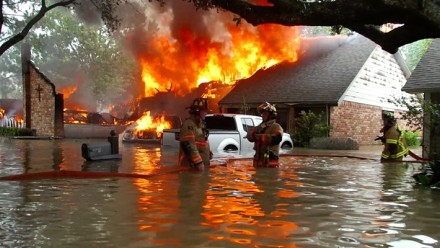Compound, Cascading and Lingering Disasters - Panel 1
Exploring complex risk, disasters and vulnerability
Compound disasters (where unrelated disasters occur simultaneously) are becoming the norm, rather than the exception, and the response to upcoming disasters in 2020 and 2021 will be done under the continued presence of the COVID pandemic. The idea of cascading disasters has recently been epitomised by the Fukushima Daiichi nuclear disaster, which was triggered when an earthquake generated a tsunami which led to reactor meltdowns, hydrogen explosions and radioactive contamination. Here two ‘natural’ disasters occurring one after the other in a relatively short amount of time caused a third ‘technological’ disaster. The ‘lingering’ effects of a disaster affect recovery and the resilience of impacted communities, yet are rarely mentioned in the media once the focus on the original disaster fades from public consciousness.
This is the first of two panels exploring complex disasters. This panel focuses on explaining different types of multiple disasters and exploring their impacts.
Speakers:
Prof Mark Howden (ANU): Framing cascading, compound and complex risk
Dr Andrew Gissing (Risk Frontiers): Compound disasters in Australia: historical analysis and implications
Dr Nicky Grigg (CSIRO): What have we learned about Australia’s vulnerability?
Em Prof John Handmer (IIASA): Identifying and governing systemic risk
Prof Mark Howden is Director of the Climate Change Institute at the Australian National University. He is also an Honorary Professor at Melbourne University, a Vice Chair of the Intergovernmental Panel on Climate Change (IPCC) and a member of the Australian National Climate Science Advisory Committee. He was on the US Federal Advisory Committee for the 3rd National Climate Assessment and contributes to several major national and international science and policy advisory bodies.
Dr Andrew Gissing is Director Government Business and Enterprise Risk Management at Risk Frontiers. He is an emergency and risk management expert. Andrew has performed various senior executive roles in the emergency management and social services sectors, including as the Deputy Chief Officer of the Victoria State Emergency Service and Director of Risk Management for the NSW Department of Family and Community Services.
Dr Nicky Grigg is a Senior Research Scientist at CSIRO Land and Water. She leads the Environmental Futures team in the Sustainability Pathways Program and works in interdisciplinary teams on a diverse range of projects concerned with global change and social-ecological systems.
Em Prof John Handmer is a Senior Science Adviser in Risk at IIASA, an Emeritus Professor with the RMIT School of Science, an Honorary Professorial Fellow with Geography, University of Melbourne, and a Fellow of the Australian Social Science Academy. He works with the Australian Bushfire & Natural Hazards Cooperative Research Centre.
Image Credit: Dalton Bennett/The Washington Post
This event is being organised and run by the Disaster Risk Science Institute.









